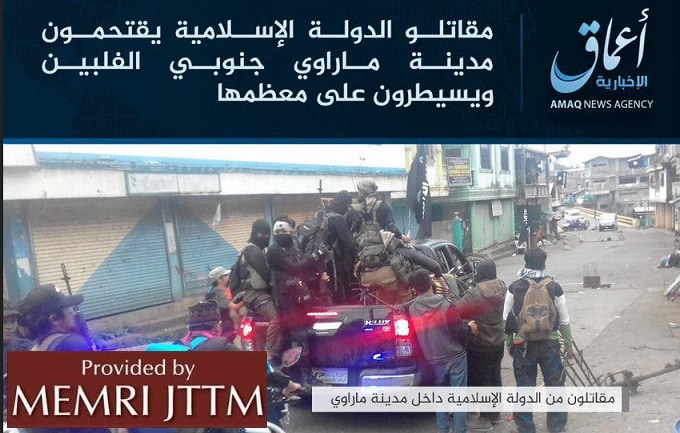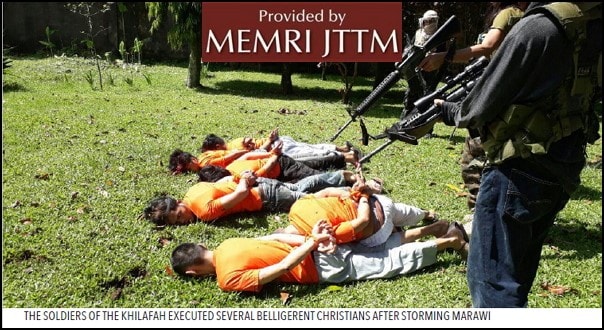In its recent takeover of the city of Marawi in the southern Philippines, the Islamic State (ISIS) deliberately emphasized its hostility towards Christians, as expressed in the wanton killing of Christians and the destruction of churches. This was also reflected in the rhetoric that accompanied the campaign, which consistently presented the fighting in the Philippines as a centuries-old war against the "Christians" and "Crusaders."
The following are examples:
In its statement about the attack on Marawi, released on May 24, 2017, ISIS made sure to note that a church had been torched and that over 75 "Crusaders" had been wounded or killed.[1]

ISIS fighters in Marawi
During its takeover of the city, ISIS took Christians hostage and later executed them. The organization reported on the execution of these "belligerent Christians" in Issue 10 of its English-language magazine Rumiyah, released June 7. On June 12 it also published a video allegedly showing the execution of Christians from Marawi.[2]

Rumiyah report on execution of "belligerent Christians" in Marawi
Another ISIS video showed its fighters destroying a Catholic church in the city. ISIS fighters are shown destroying icons, statues and crucifixes and tearing up pictures of the Pope before setting fire to the church. To see a MEMRI TV Clip of excerpts from the video, click on the player below:[3]
In an interview published in Rumiyah magazine, the organization's leader in the Philippines, Asylon Hafilon, aka Abu Abdallah Al-Muhajir, likewise described the fighting in the Philippines as part of a centuries-long conflict between Muslims on the one hand and Christians and Buddhists on the other. Christianity, he said, became widely spread in Southeast Asia under the sword of Crusader colonialism, and a small "vanguard" of Muslims took up arms to fight it. Today these Muslims have pledged allegiance to ISIS leader Abu Bakr Al-Baghdadi, whom they recognize as the leader of all Muslims. Abu Abdallah added that ISIS in East Asia was a union of several jihadi groups which all shared a long-standing ambition to establish an Islamic state in the Muslim-majority regions of Southeast Asia by means of armed jihad. Among them is the Abu Sayyaf group, known for kidnapping Westerners.

Asylon Hafilon, aka Abu Abdallah Al-Muhajir, leader of ISIS in the Philippines
Addressing ISIS's enemies in the region, Abu Abdallah declared: "...The dominion of our Muslim people will reach everything which night and day reaches. [...] So either you submit or pay the jizya [poll tax levied on Jews and Christians] willingly while subdued, or you prepare yourselves, for we will raid you."[4]
[1] For more details on the statement, see MEMRI JTTM report, ISIS Celebrates Its Taking Of Parts Of Marawi, Philippines – Freeing Prisoners, Attacking A Church, Killing 'Crusaders', May 24, 2017.
[2] See MEMRI JTTM report, ISIS Video Documents Execution Of Christians In Philippines,
June 12, 2017.
[3] MEMRI TV Clip No.6050, ISIS Members Destroy Church in the Philippines, June 4, 2017.
[4] See MEMRI JTTM report, In Interview In Issue 10 Of ISIS Magazine 'Rumiyah,' ISIS Philippines Leader Vows To Keep Fighting 'Crusaders', June 8, 2017.




